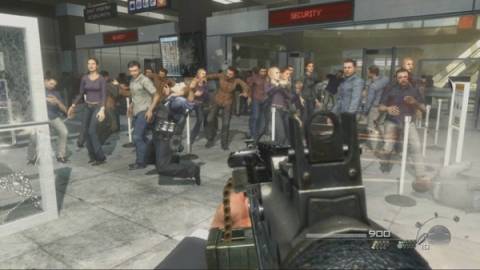The Stigma Surrounding Video Games and How To Stop It
By gamer_152 51 Comments
It’s Sunday 21st November, this is my blog, and today we’re all going to learn a very special lesson.
E-Sports
So, last weekend the finals of the 2nd GOMTV Global Starcraft II League went down in Seoul, South Korea, and the GSL 3 has already started. Recently I’ve been reminded just how inconceivably popular e-sports and specifically Starcraft are in Korea. Okay, playing video games professionally is not something that is entirely unheard of in the western world; you have your MLG and your odd tournaments here and there, but is it anywhere near close to being seen as a sporting event? Well, we all know the unfortunate answer to that.
The Video Game Stigma

It’s not as if video games are exactly unpopular in the west though, if there can be 4 million people playing Black Ops on Xbox LIVE at once then where is your flashy stadium full of screaming fans cheering on their favourite Call of Duty players? Well, I believe that for the most part this is all about how video games are seen in society in general. Granted, we’re far from the days of arcades being seen as twisted dens of depravity, and any adult playing video games being seen as a backwards social reject, but there is still an obvious stigma attached to consuming any electronic entertainment that isn’t manufactured for the casual masses.
To declare that you spent a weekend playing video games to some would make it seem as though you’d partaken in a slovenly and perhaps slightly shameful activity, but saying you spent a weekend watching sports, it would seem to almost everyone that you had committed your weekend to an entirely socially acceptable activity, even though the difference between these two activities is not all that great. In fact you could argue that if you had spent your weekend playing video games as opposed to watching sports you would probably have gotten more mental exercise. However, when these are the prejudices held against people who would play video games on a regular basis, it’s understandable how those who have dedicated a large portion of their lives to video games haven’t exactly been met with praise and admiration.
While I’m certainly not the perfect poster boy for video game enthusiasts, on my university course I’ve met plenty of people, like me, training to be computer games programmers, and most of them are perfectly normal human beings, and act just like any other university student. However, I think we all know that “I’m a games programming student” isn’t usually the best ice-breaker in conversation. Whenever I tell anyone who’s not rather seriously into video games about what I do they’ll usually politely claim an interest in my course, but I can’t help feel like there’s a little bit of them wondering if I’ll be able to uphold enough social decorum not to just drool all over the floor, or whether I’m going to burst into a high-pitched, nasally diatribe about the finer points of binary code.
The Blame Game

So, who is to blame for all these silly misconceptions, and this ignorance against fans of the interactive digital arts? Well, at this point I think most people would point towards mass media as the evil oppressive force, keeping a lot of video game players from being seen as “normal people”. My answer to whose fault it is? Well, I think it’s just about everyone’s fault. Certainly, television and the news aren’t helping. While we may be slowly drifting away from a world where any nut job can appear on any television station, and launch into a thunderous rant about how playing video games will make you into a mass murderer, rapist, addict, and carjacker rolled into one, it’s still rather striking to see that even in the 21st century, those who enjoy video games have been demonised in unfair situations such as the Mass Effect and Modern Warfare 2 controversies. Television shows such as Law & Order have also depicted those who play video games on a regular basis in a less than flattering light.
The problem is that it’s all one big cycle. It’s easier for television to play off of the popular view of a certain group of people because they know that’s what gets ratings, and when they portray that group of people in the way they do people pick up on it, it becomes their view, and the whole pointless scenario perpetuates itself over and over. Like any cycle, if it is to change it needs something to break it. To an extent, for a long while game publishers and console manufacturers did themselves a disservice by not trying to market to a wider audience, although this is now being somewhat rectified. I’m not just talking about them publishing motion control games and producing countless trailers of happy generic families jumping about their living room, although anything that can bring mainstream entertainment and traditional gaming closer is good. What might have an even greater impact is them showing that popular “core games” aren’t just for basement-dwelling thirty-somethings and over-excited twelve year olds, and I’d like to see more of that. Also, you may say what you want about games looking more and more like movies, or more famous actors and actresses voicing games, but undoubtedly these are things that are going to get more and more people interested in games.
So, that’s the media and the games industry, who else is to blame? Well, I’m sorry to say that I believe that on the whole video game enthusiasts are also negatively impacting the situation. Ben Crosshaw, better known as hot-headed video game cynic Yahtzee, wrote an article not so long ago about retiring the word “gamer” due to it having so many negative connotations in the public eye. I have to give credit to the man, he had a point; the continued use of the word is just one way in which the people who love video games have stunted the acceptance of them as a mainstream entertainment medium.
What Can We Do To Help?

I’m not calling for an outright ban of the phrase” gamer” (because where would that leave me?) but I am saying think a little more about how you act when you talk about video games. I think a big part of this links back an issue I touched on a couple of weeks back; the acceptance of “casual gamers” by “core gamers”. When the stereotype is that video game enthusiasts are uptight, overly-obsessive individuals, when we act like uptight, overly-obsessive individuals in the face of the general public playing video games, it does not help. Similarly, when the mainstream media say something dumb and discriminatory about video games, an insulting, poorly thought-out response does not help the image of the people playing video games. In fact even the way in which average game enthusiasts act on the internet can often look extraordinarily anti-social, and too often involves a kind of rudeness and crass attitude no reasonable person would display in face-to-face discussion. So, what can you do specifically?
- When you discuss video games with people act like a normal, polite human being, “It’s just the internet” is not an excuse for insulting or immature behaviour.
- Think about limiting your use of the phrases “gamer”, or “casual” and “core”, and if you can’t do that at least be careful where you use them for fear of helping fuel these unreasonable stereotypes.
- Be accepting of those who want to play video games, even if they are unknowledgeable or naive about games, everyone has the right to enjoy video games, no matter what kinds of games they choose to play.
- Finally, educate the people around you about video games. Don’t make yourself look like a crazy person and push your views on them, but I know there are a lot of people out there who would feel embarrassed to admit just how big a part of their lives video games are. Swallow your pride, admit to it, and show how people how someone who is really into video games can still act like a regular, functioning person.
All Good Things Must Come To An End

Of course, all of this is assuming you really want a world where video games are accepted as part of mainstream entertainment. I believe a lot of people dream of a world where everyone plays video games simply as a world where there are more good games and they can talk to more people about the games they play. The truth is a world where everyone plays video games is going to be filled with more games that are more palatable to the mainstream, and might only be achievable if we all do our bit to make it happen. There is an ever-expanding opportunity for us to see the day when hundreds of people will be sitting in stadiums, cheering on their favourite Call of Duty players, but progress is rarely made without sacrifice.
Good luck, have Gary.
-Gamer_152